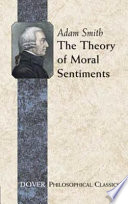Podcasts that mention 📚 The Theory of Moral Sentiments by Adam Smith

The Theory of Moral Sentiments
Mentioned 1 times in 1 episodes across 1 podcasts.
Podcasts that mention The Theory of Moral Sentiments by Adam Smith

The Daily Stoic episodes that mention The Theory of Moral Sentiments by Adam Smith
Episode: How To Teach Stoicism To Gen Z | Dr. Jennifer Baker
Published on November 13, 2024
It's like, have you read A Theory of Moral Sentiments?
During the discussion, the host references the book 'A Theory of Moral Sentiments' by Adam Smith, asking the guest if they have read it.
If you’d like to explore more in The Theory of Moral Sentiments, you can purchase it here:
